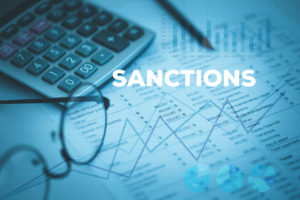Even Small Businesses Need to Know about Russia Sanctions
As businesses enter global markets, they may fail to recognize risks lurking beneath the surface. The U.S. government employs a range of tools to alter or deter what it views as objectionable behavior. Economic sanctions can be separated into three categories:
• Sanctions on Specially Designated Nationals (SDN)
• Sanctions on entities on the Sectoral Sanctions Identification (SSI) List
• Secondary Sanctions.
The major countries on the sanctions list are Russia, Venezuela, Iran, Syria and North Korea. The U.S. government targets not only foreign governments, but also individuals and businesses. In this series of articles, we provide an overview of economic sanctions, especially as they affect doing business with Russia. Each article will address a different category of sanctions. In this first article, we provide an overview of Russia sanctions against Specifically Designated Nationals (SDNs).
The Blacklist: Specially Designated Nationals (SDN)
This type of sanctions limits access to the U.S. financial system for individuals and entities listed on the blacklist, known officially as the Specifically Designated Nationals and Blocked Persons List (SDN List). A Russian company can end up on the list because of a mandatory designation or because of a discretionary designation.
Mandatory designation of SDN
How does a Russian business or individual get fall on the SDN List? There are certain individuals who are subject to mandatory designation as SDNs:
• Non-U.S. persons knowingly evading U.S. sanctions on Russia or knowingly providing significant financial, material, or technological support for significantly enhancing the Syrian Government’s military capability
• Russian government officials or their close associates or family members who have engaged in acts of significant corruption (such as bribery, expropriation of assets for public gain, extraction of natural resources)
Discretionary designation
Under U.S. legislation, the Department of Treasury in consultation with other U.S. governmental agencies, has the discretion to place entities or individuals on the SDN List. These include:
• Russian state-owned entities operating in Russian railway, metal or mining sectors
• Parties operating in the arms or related materials, financial services, energy or engineering sectors
• Russian governmental officials
• Parties involved in undermining democracy in Ukraine, threatening peace security, sovereignty or territorial integrity of Ukraine and involved in misappropriating state assets of Ukraine
The SDN List can be found on the Department of Treasury’s SDN List website.
Consequences of SDN designation
As part of your general due diligence with foreign partners, you should check the SDN List. You are prohibited from doing business with SDNs.
• U.S. businesses are prohibited from engaging in business transactions with SDNs and entities that are 50% or more owned by one or more SDNs
• Entities 50% or more owned by owned by one or more SDNs are considered blocked entities regardless of whether they appear on the SDN List
• Assets belonging to SDNs in the U.S. are blocked
• Individuals on the SDN list can be denied entry into the U.S.
Even entities partially owned by SDNs subject to sanctions: the 50% rule
U.S. persons (which means U.S. citizens, U.S. permanent residents, persons physically in the U.S., U.S. companies and their foreign branches) are prohibited from engaging in any transactions with SDNs and entities 50% or more owned by one or more SDNs.
If one or more SDNs directly or indirectly own 50% or more of the entity the entity is considered a blocked person as well, regardless of whether it actually appears on the SDN List. If you are a minority shareholder in such an entity, then you are still subject to the sanctions regime because an entity you have interest in is considered to be a blocked person. Usually that mean that you want to divest your ownership unless you can obtain a license from Department of Treasury Office of Foreign Assets Control (OFAC).
SDN property blocked
If a you are a company doing business with an SDN or a company with 50% or more SDN control or ownership, then you are required to block any properties or property interests of SDNs in your possession or control. The only way to get it unblocked is for an SDN to obtain a license through OFAC. You should consult with a lawyer who is expert in economic sanctions. If you are looking for an export sanctions lawyer, contact info@rostenlaw.com and we will refer you to lawyer who specializes in economic sanctions.

